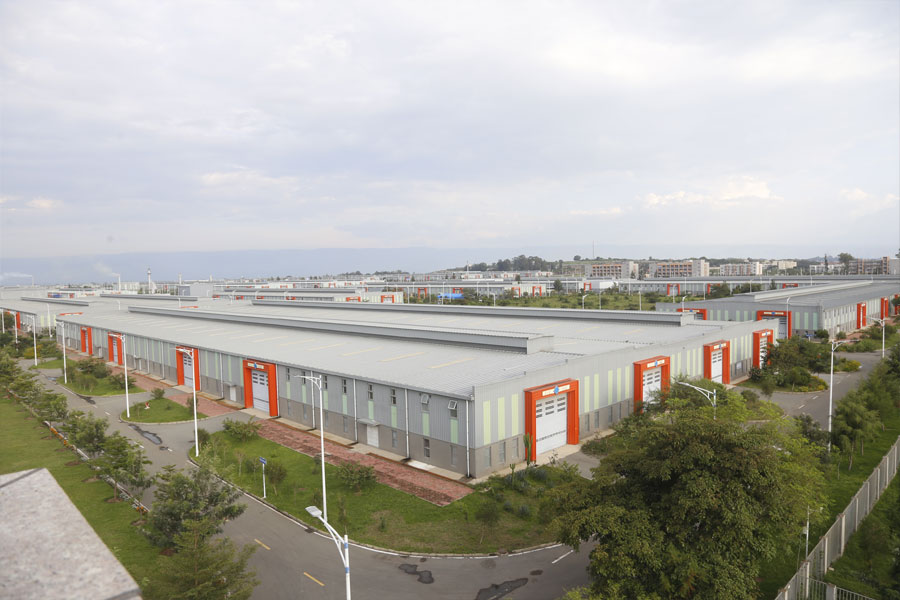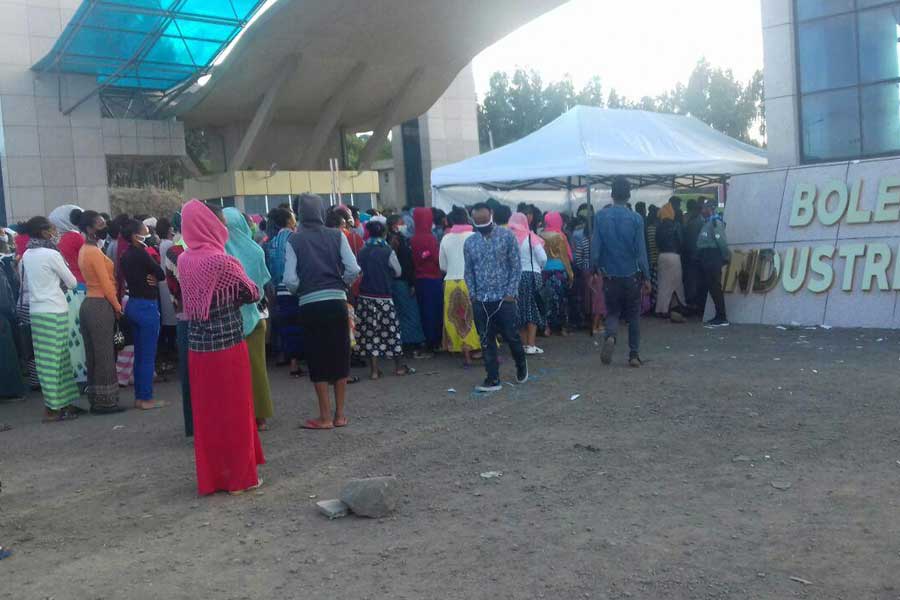
Radar | Apr 19,2025
Million Mekonnen was fired over a piece of cloth. The size of the cloth is in contention, but even she does not deny taking it.
It happened one Tuesday morning back in March while she was still working in the storage section at Bole Lemi Industrial Park. Back then, there were only a handful of Novel Coronavirus (COVID-19) cases in the country, but everyone was on their toes — vigilant against the obscure virus.
In the storage room where she worked, Million handled imported goods that came from Djibouti and distributed them to line managers at the Park. The mother of a one-year-old boy had growing concerns for her own safety, especially knowing that other countries were far more affected than Ethiopia was at the time. So she decided to make a mask from the fabric her employer was using for production.
"I'd been wearing the same disposable mask for nearly a week," she explained, "so a few colleagues and I made masks out of a minimal amount of fabric."
Her supervisor caught her and 10 others while they were working with the masks on. They were told it was a serious disciplinary breach.
"I was wearing it while I was working — It wasn't like I was trying to take it in my bag with me. I just wanted to be safe," said the 22-year old tearfully. "I used my scarf that day at work."
She was hoping they would understand and let her off easy, but 12 days later she was handed a letter stating that she had thereby been relieved of her duties.
"I pleaded with them," she said, "to cut my salary — anything but take away my job. They knew I have a son I raise alone. I was working there throughout my pregnancy."
But a committee, she was told, had deemed it a serious offence, and nothing she said or did could make any difference. After nearly six years of service in the Park, Million found herself jobless in the midst of a pandemic without so much as a day's notice.
Her termination would be one of many over the following months.
Companies at industrial parks across the country were facing a significant drop in orders due to the pandemic and the consequential restrictions. Retaining employees became a dilemma. On the one hand, keeping employees meant paying salaries despite low production; but on the other, letting them go was equally disagreeable if only for the sake of the resources the companies had spent on soft and hard skills training. The COVID-19 workplace protocol also outlawed letting go of staff without exhausting all other options first.
At Hawassa Industrial Park, the country's largest in terms of the number of sheds and employees, a middle ground solution was posited. The companies, which had recorded up to a 90pc decline in orders, would retain as many employees as possible while providing basic salaries.
All other benefits needed to be cut for the companies to continue operating, according to Belay Hailemichael, the Park's Investment Commission CEO.
This would mean cutting transportation, food and attendance allowances for employees. The latter are bonuses for employees who are present throughout the whole working month. Many park employees relied on these allowances to make ends meet. With a basic starting salary of around 900 Br, the allowances were the difference between making it through the month or not. Many employees at parks walk to work to save that transportation stipend.
Bole Lemi, with over 15,000 employees, has an on-site dormitory for 1,500 employees built by a Korean textile company operating in the Industrial Park.
As a result, nearly 7,000 employees left their jobs in Hawassa alone. In the past quarter of the fiscal year, the Ethiopian Investment Commission reported that over 11,000 people had left their jobs across industrial parks in the country, a few hundred more than the new hires made during the same period.
Turnover is not a new issue for industrial parks, although over the past few years, the rate had been steadily decreasing, according to management and investment associations at the parks. But following the onset of the pandemic, the number of new hires also plummeted significantly.
Transportation tariffs doubled following half capacity carrying laws for public transportation due to the pandemic, leaving many unable to afford the rides to and from work. Employees themselves were distraught, especially as the confirmed cases in the parks started growing. By July, Hawassa Industrial Park had more than 500 confirmed cases.
Affordable housing, however, is the biggest culprit for the high turnover rates.
Million pays 1,700 Br a month for the room she rents with her son. Though she started with a salary of 680 Br when she first came to work at Bole Lemi, over the years she had slowly managed to raise that figure to 3,600 Br. Her good performance had only just earned her another raise to 4,500 Br a month when she was suddenly let go.
"I was without any income for almost two months after that," she said. "But my landlord waived two months of rent for me."
Over 15,000 employees work in Bole Lemi Industrial Park, and at least 1,500 of them are housed in on-site dormitories built by a Korean textile company.
The company currently has 4,500 employees and plans to build more dormitories to house up to 9,000 people, according to Tinsae Yimam, general manager at Bole Lemi.
Tinsae cited employees leaving to start families as another reason for the high turnover rate. With the average park employee aged 18 to 34, this does not come as a surprise. While there has been work underway across parks to accommodate these needs through facilitating daycare centres, none have so far managed to operationalise one. This is although over 80pc of park employees are women.
For single mothers like Million, putting her child in daycare took a third of her salary.
"I was asking neighbours from time to time whenever I could," she explained.
She can no longer afford child care but is dependent on neighbours to look after her son when she is gone.
A worker-run cooperative union aimed at supplying basic consumer goods to Park employees at Bole Lemi is also in the works. Owned by employees of the park who buy shares, it is expected to ease living expenses and provide another means of income for the employees, according to the general manager.
"We've already received financing for the project," said Tinsae. "We'll launch it by June."
There are sporadic donations, like the 3,000 menstrual hygiene products donated to the Park in the past year — but nothing sustainable. The hope is to include these in the cooperative union shops that will be operational in a few months.
Though companies at the Park do not have trouble finding recruits, it is the loss of skilled labour that affects productivity, according to Meron Alemseged, project manager at Bole Lemi's Investors Association.
"The biggest challenge is human resource management because of the language and cultural barriers," she said. "Companies in the Park are employing local staff in human resource management to solve this problem."
The Investment Commission, the Park's highest governing entity, is surveying to pinpoint the exact causes of turnover. But labour experts there already have their hypothesis.
"The turnover may happen from one company in the Park to another one with employees seeking out better remuneration," said Fekadu Nigussie, a labour specialist at the Commission. "It is also affected by employees leaving for seasonal work, which may pay better."
This can be especially true in parks located in urban areas where there are competing industries. The clash of values, Fekadu explained, also plays a major role in communication breakdowns between employers and employees.
Harsh disciplinary measures, varied human resources management, lack of soft and hard skills, and feeling homesick are some of the common issues. An overwhelming majority of park employees are from rural areas with no previous exposure to this kind of work environment.
Housing units for 21,000 industrial park employees are in the pipeline, according to the Industrial Parks Development Corporation, which is exploring different options to solve the housing crisis. One of these is increasing housing stock by financing individuals to build low-cost housing in areas where parks are located. Engaging private developers to build housing and hand it over to the parks is another, while companies are offered duty-free privileges if they provide dormitories themselves.
Most of these projects have shown minimal progress but the importance of housing will be more pronounced as the 55,000 employee number is expected to quintuple upon the parks being fully operational.
Though it has been months since she was laid off, Million is still waiting to get her severance pay from her employers.
"There's a workers' association in the Park I reached out to, but they've told me to take it up with my employer," she said. "And I can't go in the compound anymore."
Talks of organising trade unions within the parks have been promptly shut down with one excuse or another over the past few years. There has been strong resistance from both employers and the Investment Commission, according to Kassahun Follo, president of the Ethiopian Confederation of Trade.
“There’s strict control over park employees –- they're not given time to participate in meetings,” he said. “Our representatives are also barred from going in and setting up in the parks."
Indeed, a great many industrial park employees have gone years without being granted leave.
But things have shown improvement over the years, according to Kasshaun, who added that the Commission is now open to talks.
“It is the right of every employee,” he said. “We're pushing for this right to be respected, and it would be good to start on the right foot with the relevant bodies.”
Ethiopia was a signatory to The Right to Organise & Collective Bargaining Convention, penned over half a century ago.
The minimum wage is also another tool that is expected to provide support to workers at this time. A law to give legal establishment to a wage board in charge of setting the standard is expected to be finalised in three months. The Confederation, however, is conducting its own study in preparation for the discussions that will come following this legal establishment.
"We need to have the discussion on minimum wage based on research," Kassahun said. "We're doing assessments now to find a ground that is mutually beneficial to both employers and employees."
The long, drawn-out process to avoid setting a minimum wage has been justified in different ways, according to Mehari Redai (PhD), an expert in employment law.
"The argument that the country is following market-based price setting doesn't hold water for multiple reasons," he said. "Labor isn't a commodity as per the International Labour Organisation's Declaration of Philadelphia."
The government has also been setting prices for many other commodities in the country as well, so there is no uniformity there, according to the expert.
Even countries following free-market principles have set minimum hourly or daily wages, he explained. However, a government that cannot ensure unemployment benefits to citizens may opt to focus on creating job opportunities instead, according to Mehari.
"The quality of the jobs comes as a second priority for countries that don't have this default position," he said.
But the wages outside of the industrial parks also have to be considered, advised the expert.
Million is now working as a shop keeper, earning less than half of what she used to get paid. She washes clothes for people on the weekends to make ends meet. And while that means that her Sundays are no longer reserved for time with her son, she is grateful that she is at least able to provide for him.
PUBLISHED ON
Nov 14,2020 [ VOL
21 , NO
1072]

Fortune News | Dec 04,2022

Fortune News | Jul 25,2020

Fortune News | Dec 25,2021

Radar | Mar 25,2023

Fortune News | Feb 08,2020

Dec 22 , 2024 . By TIZITA SHEWAFERAW
Charged with transforming colossal state-owned enterprises into modern and competitiv...

Aug 18 , 2024 . By AKSAH ITALO
Although predictable Yonas Zerihun's job in the ride-hailing service is not immune to...

Jul 28 , 2024 . By TIZITA SHEWAFERAW
Unhabitual, perhaps too many, Samuel Gebreyohannes, 38, used to occasionally enjoy a couple of beers at breakfast. However, he recently swit...

Jul 13 , 2024 . By AKSAH ITALO
Investors who rely on tractors, trucks, and field vehicles for commuting, transporting commodities, and f...

Oct 4 , 2025
Eyob Tekalegn (PhD) had been in the Governor's chair for only weeks when, on Septembe...

Sep 27 , 2025
Four years into an experiment with “shock therapy” in education, the national moo...

Sep 20 , 2025
Getachew Reda's return to the national stage was always going to stir attention. Once...

Sep 13 , 2025
At its launch in Nairobi two years ago, the Africa Climate Summit was billed as the f...